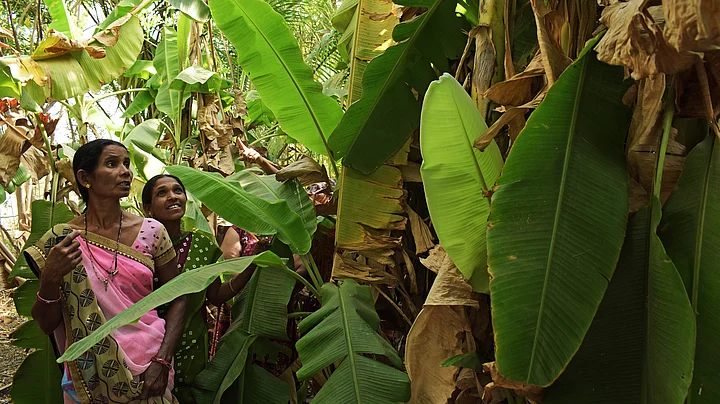Over the past two decades, India has seen an average increase in temperature of 0.7°C. Several states have witnessed erratic rainfall, longer drought spells, and severe heat waves.
Climate change has disproportionately impacted women due to their social and economic status, limited access to resources and negligible standing in the decision-making processes, and restricted mobility in times of crisis.
Socio-cultural norms and childcare responsibilities often prevent women from migrating or seeking refuge during climate change induced disasters.
Debabrat Patra from ActionAid found that “women were the last to enter cyclone shelters and first to leave” at the time when cyclone Fani hit Odisha in 2019.
Women Make Up 12% of India's MSMEs
In India, 65 percent of female workers depend on agriculture, and they contribute around 55- 66 percent of the total agricultural production.
Due to their growing roles in agricultural production and household management, women have historically developed an understanding of natural resource management and rationing.
Findings from a study highlighted that a higher percentage of women are likely to notice the impact of climate change on reduced water availability, agricultural productivity, and livestock problems than men.
There is substantial evidence that suggests that women’s knowledge of natural resources and their potential to develop overarching solutions to climate change can create co-benefits.
Moreover, there is need to create sex-disaggregated data in documenting women’s roles and engagement in climate change adaptation to better highlight the contributions made by women.
Thus, there is an increased need to integrate women in the decision-making processes, and together contribute towards stronger environmental outcomes.
Women also account for 12.6 per cent of the workforce in India’s 63 crore Micro, Small and Medium Enterprises (MSME), making it the second largest sector after agriculture.
As many as 98 per cent microenterprises owned or managed by women were among the first to shut down during the COVID-induced lockdown situation.
MSMEs have a high potential to unlock women’s resilience to climate change; however, the role of women entrepreneurs here remains limited.
Thus, there is a need to increase investments towards creating climate resilient communities and organisations with women at the centre of planning and implementation contributing towards a sustainable future.
Private sector can play a critical role by investing in gender-responsive climate funds and provide MSMEs with targeted help.
Investing in Women Could Add 25% To the Global GDP
One thing is clear – building climate resilience while disregarding women as vital stakeholders in the process can significantly undermine the sustainability of climate interventions.
A recent study has showed that investing in women across the value chain could positively add 25 percent to the annual global GDP by 2025. Globally, gender-responsive climate financing remains at a very nascent stage.
Although there has been a 42 per cent increase in global climate financing in the last decade, most of them remain gender blind.
In 2021, less than 2 per cent of the total climate investment was gender-responsive.
In India, women are already playing a leading role in climate change. The recent partnership between National Research Development Corporation (NRDC) and Self Employed Women's Association (SEWA) with women “agariyas” or salt farmers has been an interesting example of women working in clean energy solutions and creating employment opportunities at the local level.
As businesses prepare to factor Environmental, Social and Governance (ESG) goals in investments, women in businesses can assume key roles in pushing the agenda of gender-responsive climate action.
To support gender-responsive climate financing, there is a global need to scientifically prove the impact of gender sensitive approaches in climate financing towards a greener economy.
Gender Equality and Climate Change
Another critical step would be to engage civil society and the private sector for enhanced accountability and visibility of climate initiatives.
Organisations across the national, state, regional, and community level can play a key role in this move.
Facilitating advocacy efforts to promote gender equity issues in climate financing and building CSOs capacity will be instrumental in integrating a gendered lens for climate planning and promptly reporting any violation of rights as part of this strategic positioning.
Similarly, women climate entrepreneurs will be another set of key players.
Investing in women, by women, and for women can bring in significant financial returns along with creating positive environmental and developmental impact.
A dual, socially-just lens strategy of integrating gender and climate change in investment decisions would not just lead to better gender or better climate actions, but better outcomes for everyone.
The integration of these two areas can provide the necessary push to climate action.
(Priyanka Cardoz and Bhavya Tyagi work at the Strategic Investment Research Unit of Invest India, GoI’s National Investment Promotion Agency. This is an opinion piece and the views expressed above are the author’s own. The Quint neither endorses nor is responsible for the same.)
